Vanguard students watch presidential debate through ‘Year of Civility’ lens
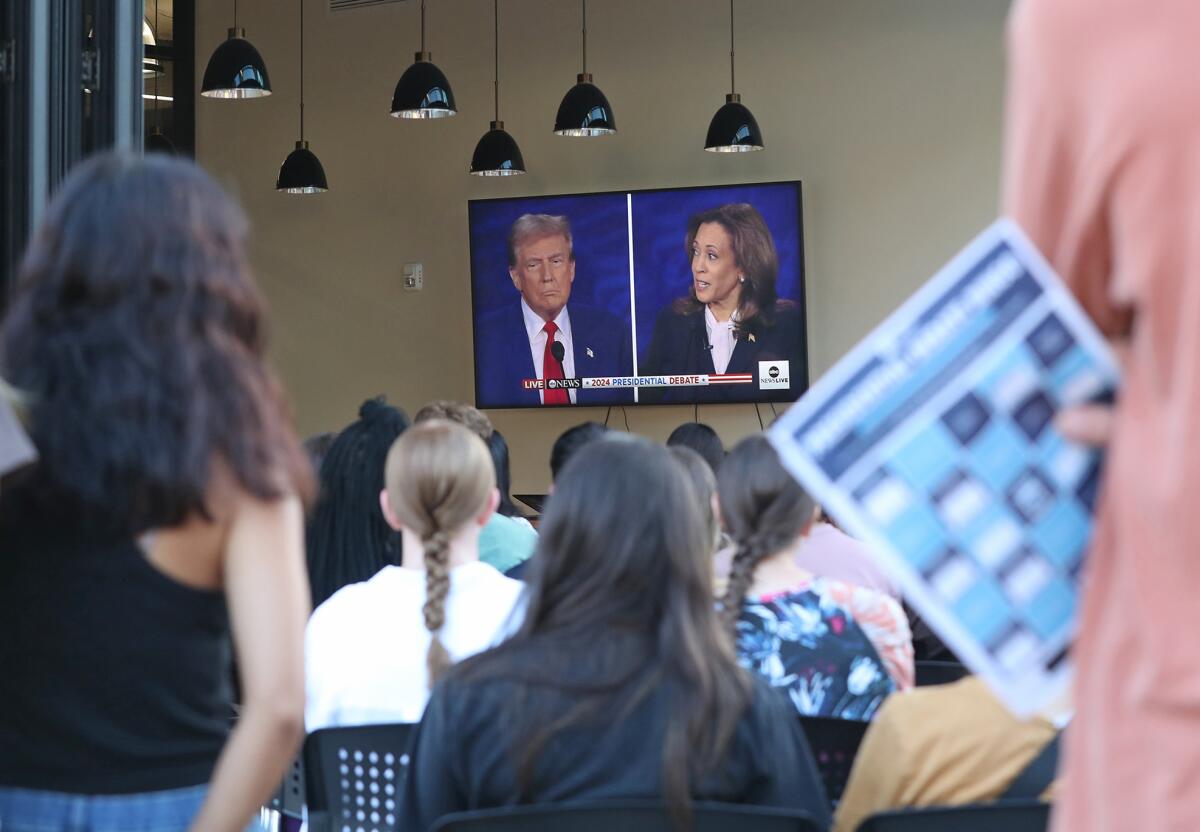
- Share via
Vice President Kamala Harris extended a handshake to former President Donald Trump before Tuesday night’s presidential debate in Philadelphia.
Thousands of miles away, dozens of Vanguard University students at a debate watch party on campus in Costa Mesa marked their bingo cards.
“Extends a handshake” was one of the positive items listed on the university’s presidential debate bingo game.
Other, more negative items included “interrupts their counterpart,” “polarization” and “avoids a question.”
The 90-minute debate gave the students plenty to chew on. Afterward, Vanguard political science professor Eunice Kang asked a panel of preselected students from both sides of the aisle their take on what they saw.
The watch event was part of Vanguard’s “Year of Civility.” In a hyperpartisan environment, the private Christian university is spending this election year seeking to guide its students into engaging in more respectful conversations.
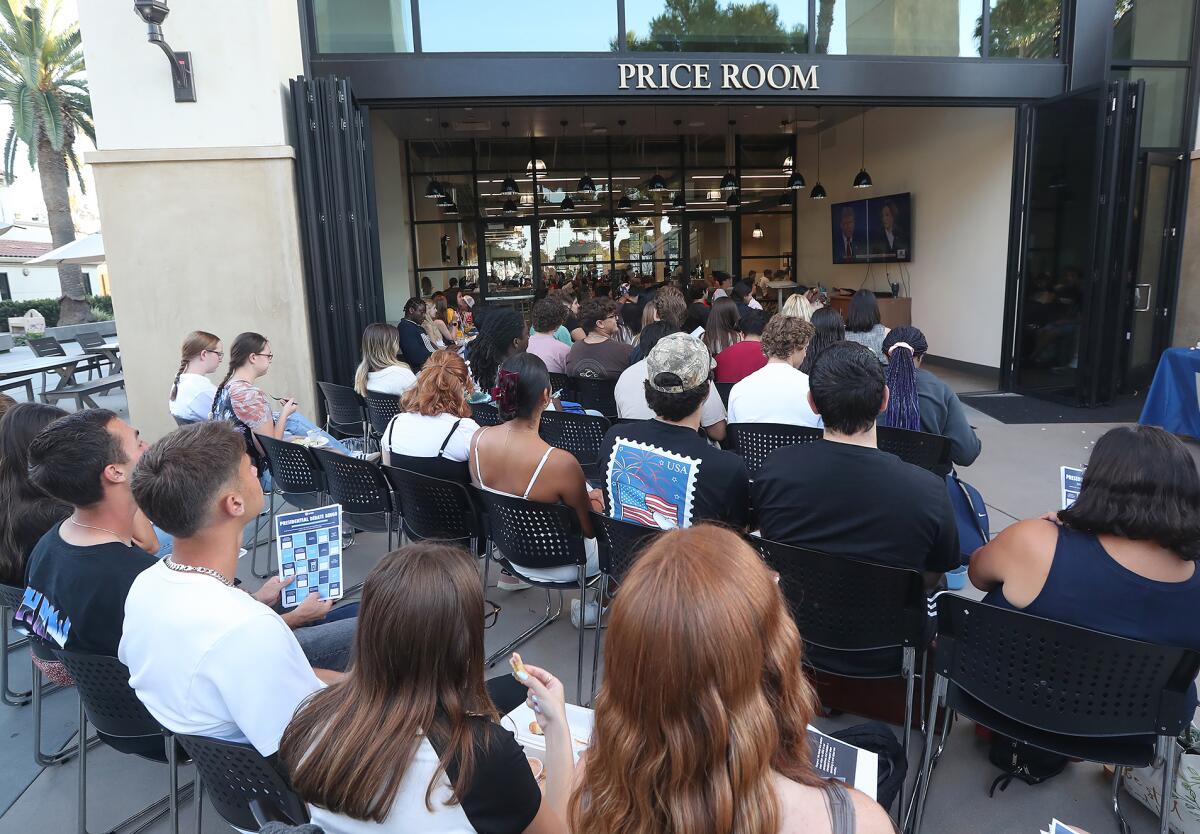
“If you think about it, the last 20 years or so of politics has been exceptionally divisive,” said Vanguard Chief Diversity Officer Renae Braithwaite, who also serves as the college’s dean of the School of Theology and Ministry. “So, our students have grown up in an environment that’s been exceptionally divisive. Research is showing that they want to learn a better way. The Year of Civility is a way for us to showcase that there is a better way, and we can treat people with dignity, respect and humility even when we differ. In fact, especially when we differ.”
Students at Tuesday night’s watch party were taught the concept of political sectarianism, which focuses less on ideas and more on political hatred of those with differing views. When politics turn partisan, tactics like othering, aversion and moralization are often used.
Asher Russ, 20, is a Vanguard junior history and political science student who is familiar with these phenomena.
“Our generation, at least my age and younger, has never seen a civil election,” Russ said. “I don’t know what that looks like. So for me, this hasn’t been super out of the ordinary, because in my head, an election being crazy and everyone yelling at each other is the norm.”
Russ has watched this cycle with interest and seen the reactions of his Gen Z peers when President Joe Biden dropped out of his reelection campaign, for example, or the assassination attempt on Trump. He also read “Undue Hate,” a book written last year by MIT Professor Daniel Stone that focuses on a concept called affective polarization.
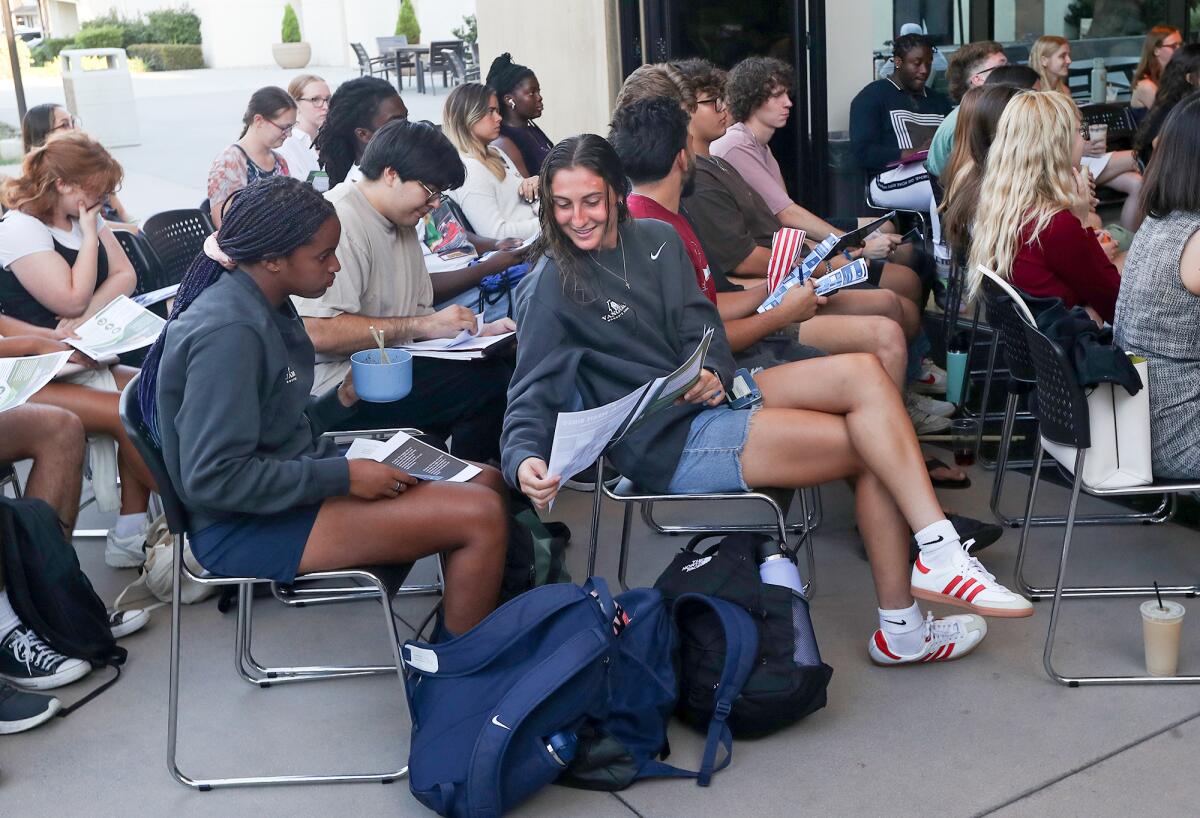
“Back in the day, say a neighbor mows their lawn differently than you,” Russ said. “You’d say, ‘Oh, they just like to mow their lawn different.’ But now, it would be like, ‘They mow their lawn differently, they must be a terrible person.’ Instead of thinking someone with different political ideation just believes or thinks different than you, you attribute negative characteristics to them.”
Vanguard has been using dignity, respect and humility as the key principles of its Year of Civility programming. Those align with the university’s core values of truth, virtue and service, said Amanda Lebrecht, the college’s vice president for student development.
Vanguard even extended the principles to its own Student Government Assn. elections this year.
“The year before, it had been really contentious,” Lebrecht said. “That’s when I realized, ‘Oh, you don’t know any different.’ We had to have lots of hard conversations. We moved away from a two-candidate ticket to a one-candidate ticket because we were finding that the candidates couldn’t be responsible for each other’s friends behaviors.”
Vanguard history and political science senior Zoe Barba was one of the three candidates for SGA president. Though she didn’t win, she said she appreciated the more collaborative process. She and the other candidates, including eventual winner Amberly Gourlay, met up to discuss what ideas they wanted to implement on campus.
Barba served on the pundit panel following Tuesday night’s debate.
“I’m excited to be with my peers listening to both sides,” she said. “I love learning why people think the way they do, and why they vote for said person. In my family, politics was never really a topic because it brings so much division. That’s the reason I chose this as my major, to learn more about politics and history and how it all forms together.”
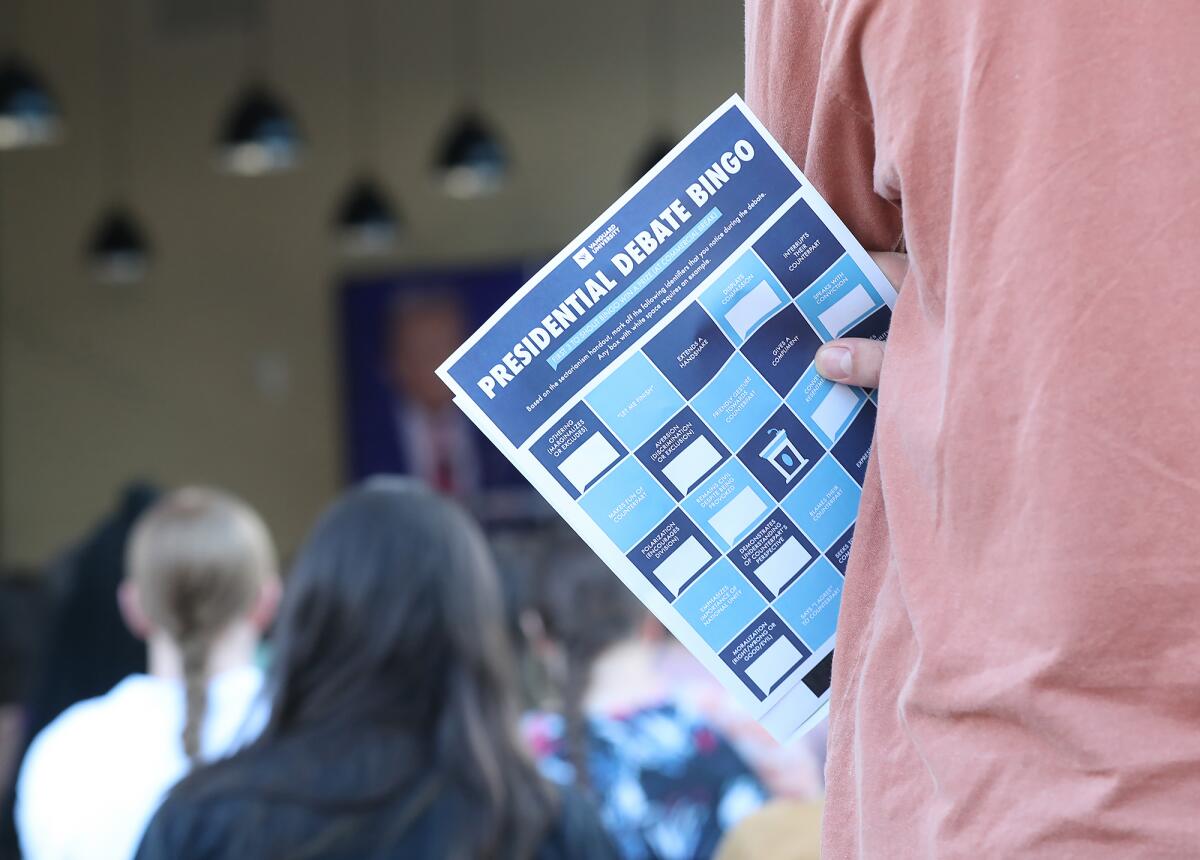
The Year of Civility featured a celebration of Women’s Equality Day on Aug. 26 to start the school year. Vanguard also has three different professional development events for student leaders and employees scheduled through November.
The first one, titled “Dignity and the Image of God: How to Engage in Civic Life with Love and Wisdom” takes place on Monday. Dean of the School of Education Jeff Hittenberger and Assistant Professor Renée Rose are the presenters.
No matter the outcome of the presidential election, Lebrecht said the university has established a Year of Civility curriculum for the weeks to follow.
“Once we know the outcome of the election, how do we care well for our community?” she said. “We’ll determine as a committee how do we continue into the spring, in light of the result of the election.”
Braithwaite said teaching students to practice civility is not partisan, and it’s not cowardice either.
“The most civil thing to do is be courageous, but how you are courageous is what we’re trying to get at,” he said. “I think that dovetails very well with what we believe about Christianity, that we love our neighbors. Our neighbors are not others, our neighbors are not our enemies, our neighbors are not targets to be demonized. Our neighbors are people like us.
“It’s entirely consistent with a Christian university that we teach our students how to go out in the world in this way, that we treat people with dignity and respect and that we act with humility.”
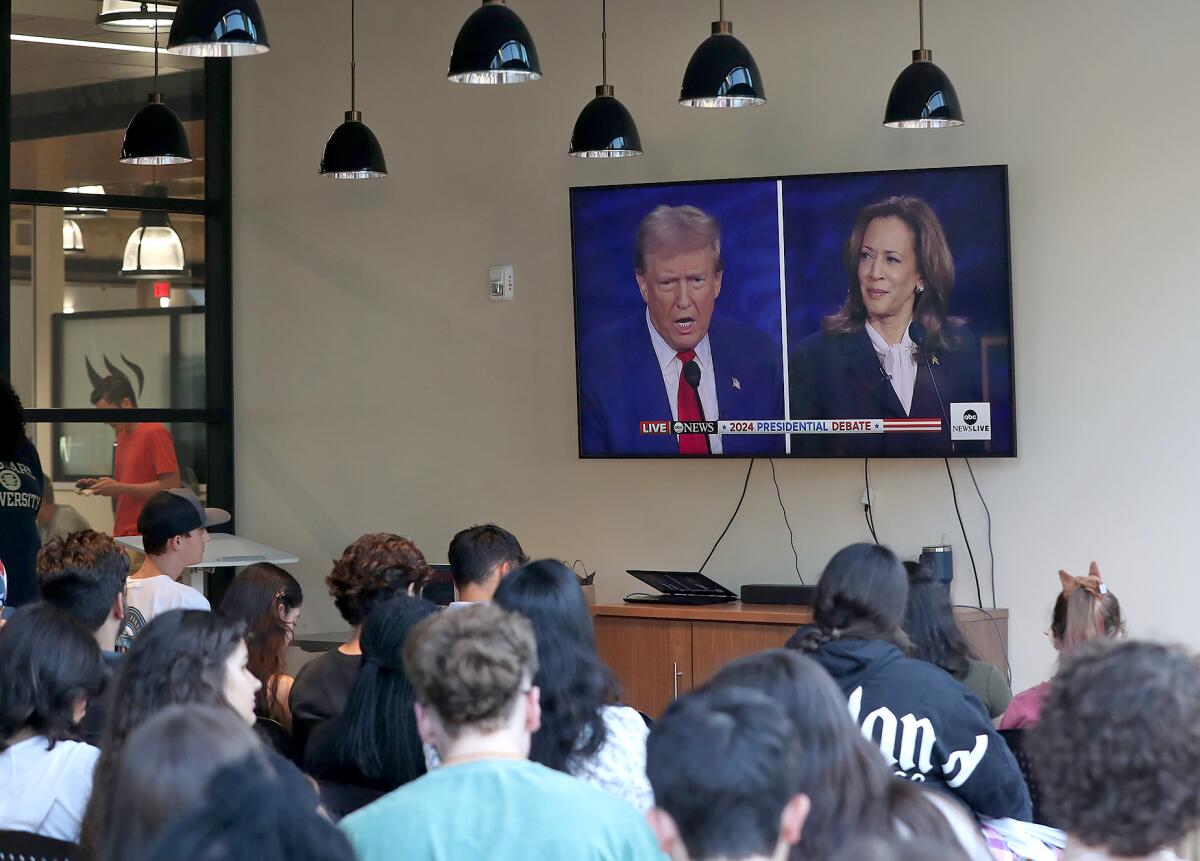
Russ has hope for his generation. An informal survey of 100 Vanguard students he conducted Monday found that 82 of them said they were planning on voting. Of those, three-quarters said they already knew who they were going to vote for, which he said surprised him.
In one of his classes, he has seen a now-famous clip of presidential candidate John McCain on the campaign trail in 2008. McCain took the microphone from a supporter who called opponent Barack Obama an Arab and said Obama was a “decent family man, citizen that I just happen to have disagreements with on fundamental issues.”
“That’s a super-crazy video because that would just never happen now,” Russ said. “It just wouldn’t. I hope we can get back to that.”
All the latest on Orange County from Orange County.
Get our free TimesOC newsletter.
You may occasionally receive promotional content from the Daily Pilot.








